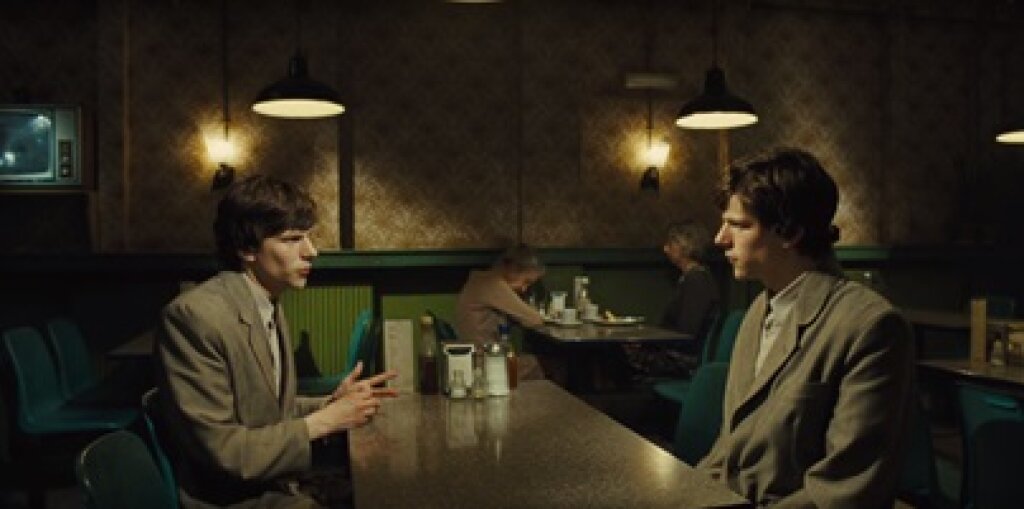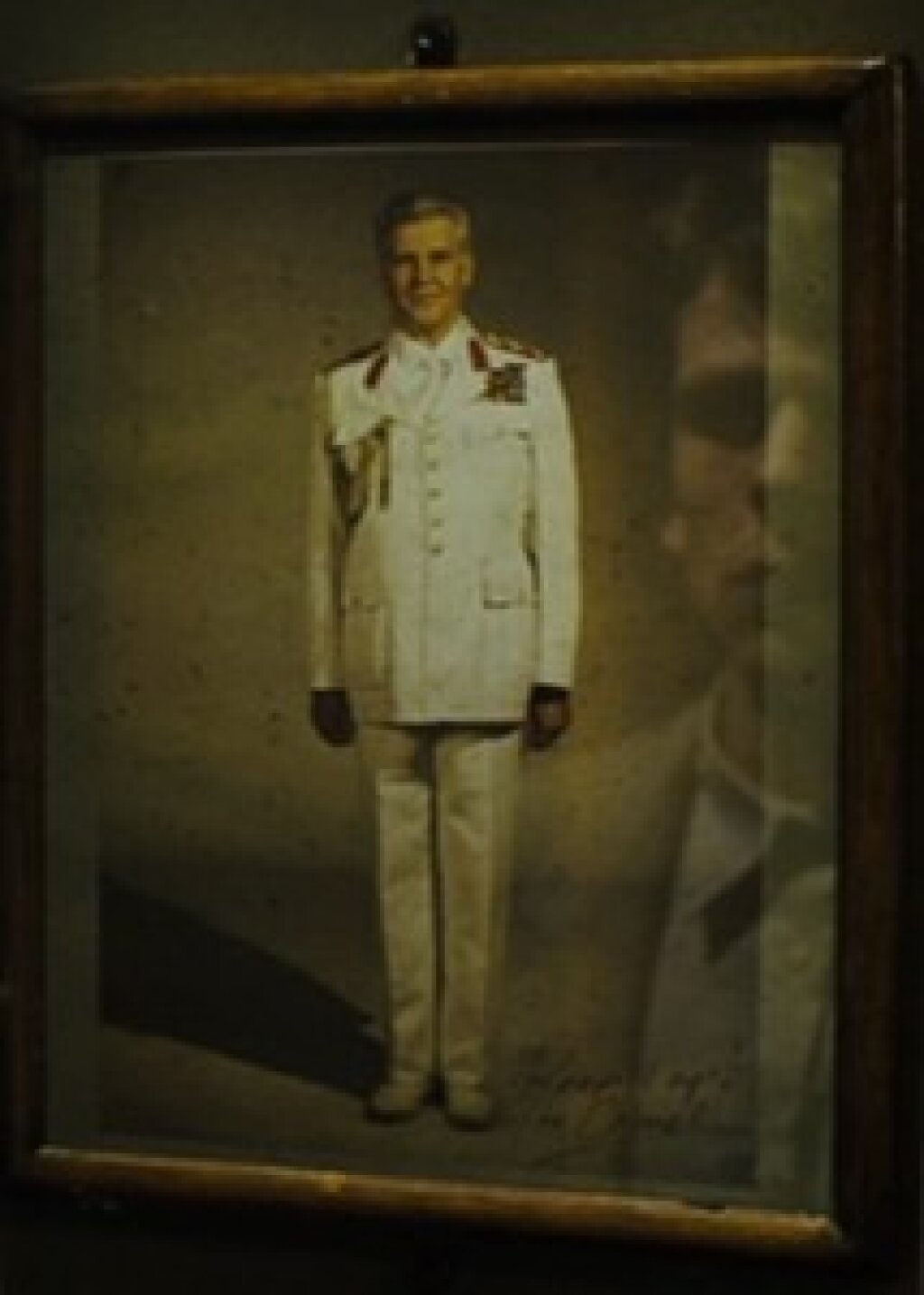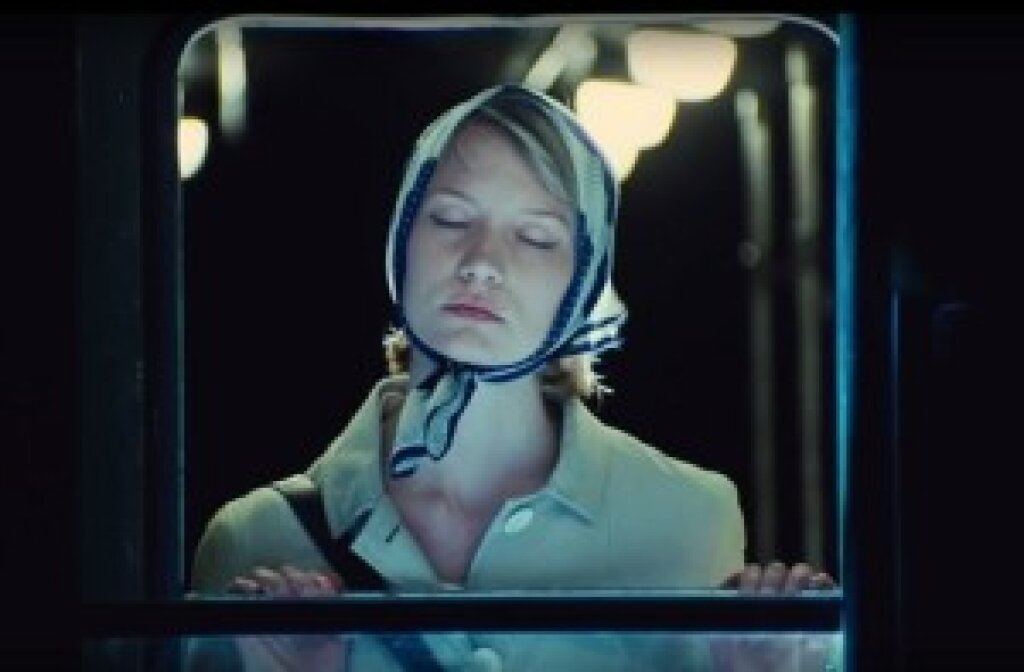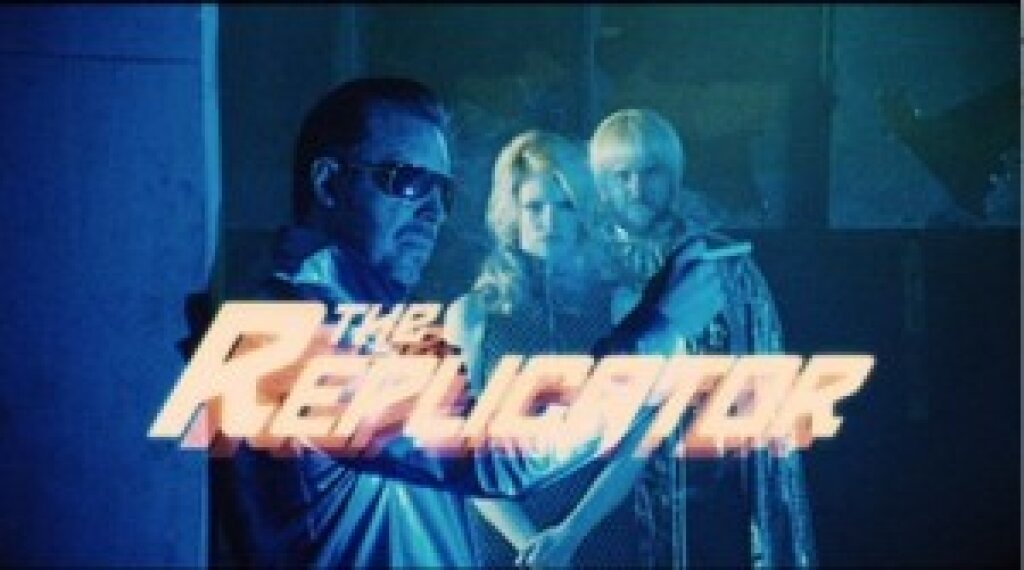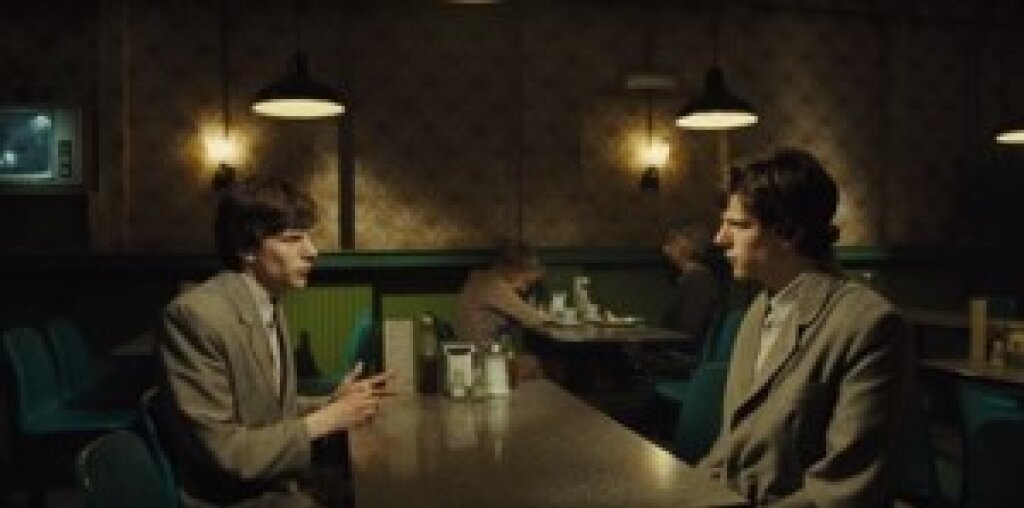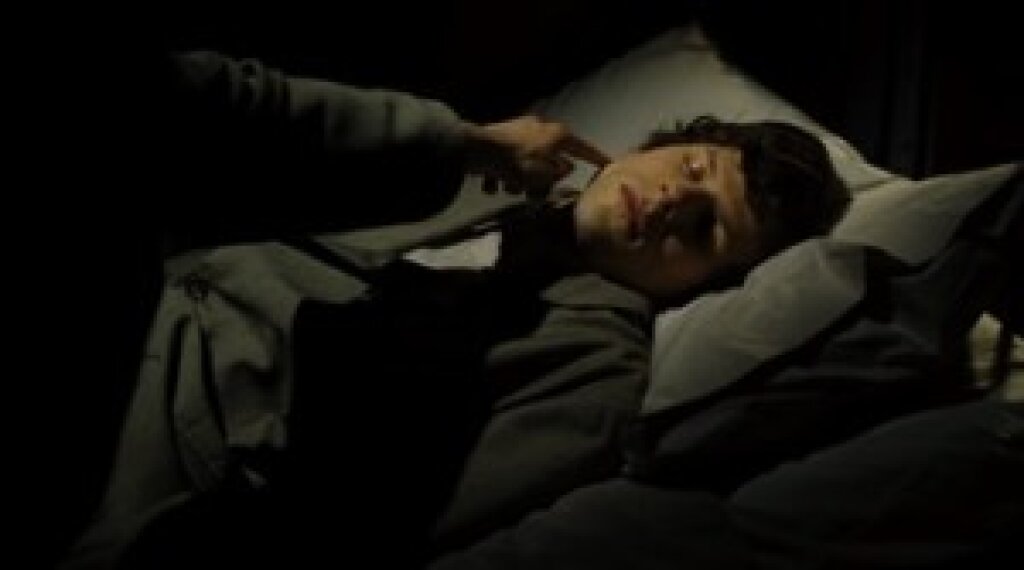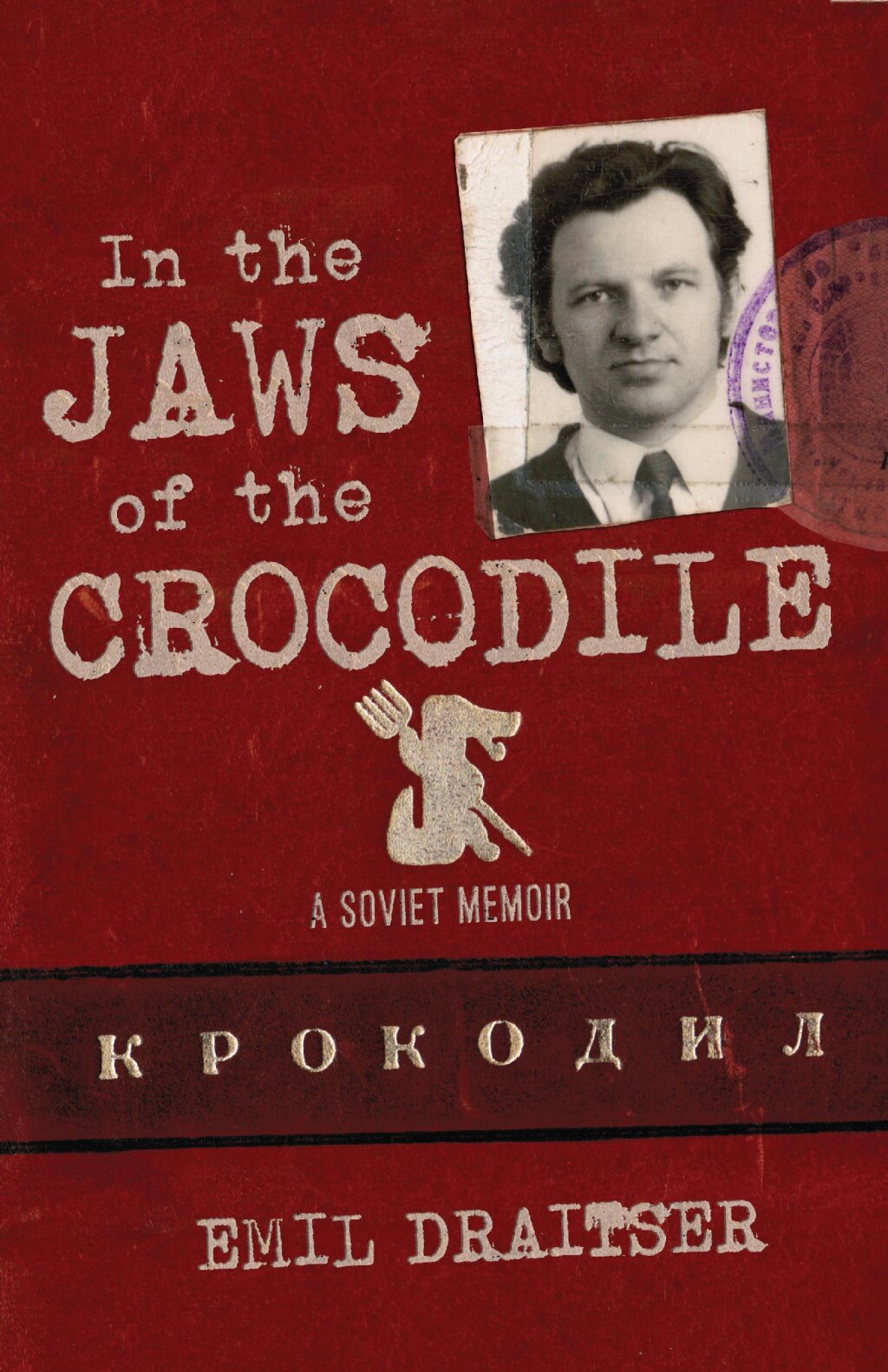This is the first in a series of posts organized by the North American Dostoevsky Society, which is hosting a multimedia, online event in connection with a screening of Richard Ayoade's film adaptation of The Double on November 6.
Connor Doak is a lecturer in Russian at the University of Bristol, UK.
Often, it takes an adaptation or spin-off of a classic literary work to reveal the hidden dynamics of gender and sexuality that bubble just beneath the surface of the canonical text. Thus Wide Sargasso Sea famously picks up the untold story of Bertha Mason, the madwoman that Charlotte Brontë kept locked in the attic. Frank O’Hara’s poem “Mayakovsky” locates a camp aesthetic behind the great Soviet poet’s overblown, declamatory style. And, I would argue, Richard Ayoade’s 2013 transposition of The Double to a retro-futuristic dystopian world uncovers a polemic against masculinity in Dostoevsky’s 1846 novella.[1]
By masculinity, I do not simply mean a set of traits such as suave self-confidence, a manly swagger, or the ability to seduce women. To be sure, in today’s society such characteristics carry important social and cultural currency for the men who possess them, a fact that Ayoade’s film highlights. However, gender theorists have moved away from defining masculinity based on a normative checklist of features. Rather, following the lead of Raewyn Connell, they concentrate on masculinity as a system of power relations both between men and women and among men themselves.[2] On the one hand, a hegemonic masculinity serves to keep women subordinate socially, politically, and culturally. On the other hand, the system of masculinity also creates division among men, generating hierarchies with privileged and subordinate groups. Yet the recent poststructuralist turn in masculinity studies emphasizes the inherent instability of these seemingly fixed masculine hierarchies. Building on Judith Butler’s work, scholars believe certain types of gender performance are capable of exposing the constructed nature of masculinity and subverting the existing system.[3] I believe that The Double—both book and film—reveals both the existence of these masculine hierarchies and their constructed, unstable nature.
A Few Good Men
Right from the outset, Ayoade’s film establishes the presence of a masculine hierarchy. Simon, an awkward, mousey junior office worker—Ayoade’s version of Golyadkin—is first seen sitting on the train making his morning commute. An intimidating, suited man intones “You’re in my place,” demanding that Simon get up. Simon quickly accedes. Yet the carriage is empty and the stranger’s order appears to be a mere exercise in the demonstration of power. This encounter sets the tone for the first part of the film, in which Simon faces a number of humiliating encounters at the expense of his superiors. However, he remains in awe of his boss, the powerful and mysterious figure known only as the Colonel. After arriving for work in the morning, Simon’s gaze lingers longingly on a statuesque portrait of the Colonel. The mise-en-scène encourages the viewer to contrast the masculinity of the two men. The Colonel stands smiling, upright in full military attire, whereas we see part of Simon only through his reflection: pale, uncertain, almost ghostly in appearance.
The film’s treatment of masculinity builds on elements already present in Dostoevsky’s novella. Hyperconscious of his status in the masculine hierarchy, Golyadkin often feels humiliated by other men who are above him in terms of wealth, social status, or simply good looks. Thus when Golyadkin finds himself standing beside “some officer, a tall and handsome fellow” at a party, he feels “like a real little insect” (36) next to this exemplar of virility. Indeed, in every simple social interaction that Golyadkin performs, he reveals his inability to conform to the script of masculinity despite his best efforts to do so. Thus his attempt at a friendly slap on the shoulder turns into “something completely different,” (22) as he exceeds the boundaries of behavior permitted between men. However, Golyadkin is more complex than Ayoade’s timid Simon. He generally responds to his humiliation with a characteristically Dostoevskyan masochism, but, as Joseph Frank points out, he also likes to imagine himself as an “all-conquering hero.”[4] This inner conflict has often been interpreted as Oedipal in nature, but Russell Scott Valentino gets closer to the truth when he writes that Golyadkin’s illness is not a psychological disorder but a social one connected with the emergence of masculine ambition in the increasingly commercialised environment of Dostoevsky’s Petersburg.[5]
Gender is a relational concept, and masculinity is defined in relation to its other, femininity. In Ayoade’s film, the character of Hannah embodies a rather conventional, caring femininity that acts as a foil for—and refreshing alternative to—the systems of hierarchy and domination that characterize masculinity in the dystopian world. In the film’s opening sequence, Simon catches sight of Hannah’s ethereal presence: her smooth skin, her eyes closed and smooth, pale skin evoke a dreamlike quality. Throughout the film, she alone has a smile and a kind word for Simon.
Hannah represents Ayoade’s expansion of Dostoevsky’s hint at the promise of a caring, feminine ethic that might oppose the hierarchy and domination associated with masculinity in the text. Golyadkin believes that Klara Olsufyevna embodies a spirit of beauty and truth that the men around her have rejected, and even imagines that he receives a letter from her offering to elope together from a society that is inherently false. Dostoevsky’s later writings show that the author came to believe that women could redeem the nation: in 1873 he praised Russian women for possessing “sincerity, perseverance, earnestness, and honour, the quest for truth and sacrifice,” adding that “these qualities have always been stronger in Russian women than in men.”[6] Yet whatever the author’s own position on women might have been, the text of The Double makes Golyadkin’s romantic assumptions about Klara Olsufyevna appear like the delirious fantasies of a madman, and the reader is inclined to see his idea of a redemptive femininity as a false construct.
The key passage that reveals Dostoevsky’s critique of the constructed nature of gender is the description of the glitterati at Klara Olsufyevna’s party. The narrator admits his inability to capture the beauty of the high society ladies and the brilliance of the young men:
How can I depict this extraordinary and dignified mixture of beauty, brilliance, decorum, merriment, kind respectability and respectable kindness, playfulness, joyfulness, all these games and jests of all these civil servants’ ladies, more like fairies than ladies—speaking in a respect advantageous to them—with their lilac-pink shoulders and faces, with their ethereal figures, with their playfully, lively, homeopathic, to use the elevated style, feet? (31)
While the narrator purports to admire this scene, his language lapses into a set of clichés (“kind respectability” and “respectable kindness”), and it becomes obvious he is parodying the fashionable discourse of his day (“homeopathic” for “tiny”). The description of femininity is so exaggerated that it reveals its own absurdity (“more like fairies than ladies”). Similarly ironic is the description of idealized masculinity that follows: “brilliant civil service cavaliers… profoundly imbued with a sense of beauty and of their personal dignity” (31). Mikhail Bakhtin discussed the power of parodic language in The Double, but does not consider its relationship to gender.[7] To borrow a phrase from Butler, the parodic language here allows us to read the behaviour of the ladies and gentlemen as a “gender performance that will enact and reveal the performativity of gender itself” (177). We might even say that Dostoevsky reveals this dazzling world of heterosexuality to be “both a compulsory system and an intrinsic comedy, a constant parody of itself” (Butler, 155).
Doubles and Replicators
Ayoade uses a similar technique of parody to reveal the constructed nature of masculinity. His parody proves more immediately accessible to a twenty-first century audience, as it draws on familiar markers of masculinity. Simon’s favourite television programme is The Replicator, an action serial that evokes the “hard-bodied” masculinities of the 1980s.[8] The show’s gun-wielding hero bears more than a passing resemblance to Arnold Schwarzenegger’s Terminator with his shades and leather jacket, and its flamboyant costumes and highly theatricalized violence ensure the audience view it as parody. The hero disposes of his enemies with appropriately virile one-liners that recall the best—or the worst—of Hollywood action movies: “Get up! Or do you want to die on your knees, like a snake?” The effectiveness of this parody of masculinity stems from the fact that these images of the eighties still resonate with the cultural memory of his audience, but already seem overblown and passé as they are one or two generations removed from current trends. Ayoade thus ensures his audience takes a critical view not only of the construction of masculinity in his dystopian society, but also positions his own film as a critique of the hypermasculinity that Hollywood blockbusters have often championed.
While Simon’s fascination with the Colonel demonstrates his need for a father figure and his desire to remain subservient to the existing hierarchy, his identification with the Replicator reveals a longing to become the usurper who overthrows the establishment. To put it another way, as a subject he is required to negotiate between two different myths of masculinity: one that stresses the importance of respecting the existing hierarchy, and another that glamorizes the rebel. Simon, then, is caught between two incompatible poles of masculinity. I believe it is Simon’s inability to resolve this conundrum that leads to his splitting and the appearance of his double, called James in the film. It is no coincidence that James first appears after Simon has finished viewing an episode of The Replicator, or that James possesses the idealized masculinity that (part of) Simon has always longed for. James exudes self-confidence, easily scores success with women, and quickly gains promotion to senior executive at work.
The difference between Golyadkin Sr. and Golyadkin Jr. in Dostoevsky’s text also plays out in terms of masculinity. Golyadkin Jr. is able to quickly adopt just the right professional demeanor with his colleagues: at work he has an “official… businesslike air” that makes him look as though he has just been “dispatched on an special mission…” (71). His work proves exemplary and, His Excellency, “extremely pleased,” even thanks him in person (76). The fact that the two Golyadkins are identical in appearance, but yet come to sit on different ends of the masculine hierarchy reveals the arbitrary and even absurd nature of how masculinity operates. Ayoade, using the medium of film, can capitalize on this idea even more than Dostoevsky. In his movie, Jesse Eisenberg plays the roles of both the bashful Simon and the brash James, and much comedy derives from the sharply differing attitudes that the two identical men elicit.
Sleeping with the Enemy
James’s cockiness initially proves appealing for Simon, and he becomes a masculinity coach for Simon, teaching him how to pick up women and taking him out on the town. The audience may feel drawn to James during these scenes, adopting what Laura Mulvey called a narcissistic “male gaze” as we view James as a “screen surrogate” who realizes our fantasies (and Simon’s fantasies!) of masculine omnipotence.[9] However, the parody becomes obvious again in a stylized montage sequence of the two men frolicking through the streets and even getting into a pillow fight. Here Ayoade targets the 1970s “buddy film” or the more recent “bromance” in which homosocial bonding and intimacy is central to the development of two central male characters, but where homosexuality is precluded as a possibility. As Michael DeAngelis notes, the two men in a Hollywood bromance must explicitly deny any romantic or sexual interest in one another.[10] As if on cue, James asks Simon “You a flamer?” to which he gives a resigned but definitive “No.” Yet there is another hint of gay romance soon afterwards, as Simon puts James to bed and lets his gaze rest on him, before caressing James’s face.
This bedtime scene builds on a passage in Dostoevsky’s novella with its own homosexual subtext. When Golyadkin Jr. returns to Golyadkin Sr.’s home, the two men drink together, exchange confidences, and express affection for one another. Golyadkin Jr. even composes a quatrain of verse for his host, leaving him “completely and deeply moved” (66) and teary-eyed. Yet just as Ayoade is parodying the cinema’s treatment of masculinity in the buddy and bromance films, so Dostoevsky is poking fun here at the contrived nature of the sentimental masculinities of his day. While Dostoevsky’s text says nothing explicitly about desire between the two men, critics such as Lawrence Kohlberg have identified elements of homosexual desire in the text.[11] Significantly, this moment of nocturnal intimacy promises a temporary respite from the usual regulated forms of masculinity that govern relations between men. Yet all too soon, Golyadkin Sr.’s vague fear surfaces that his familiarity has somehow overstepped the mark (“haven’t I gone too far?”, 68). This comment, along with his order to his servant Petrushka (“don’t think anything…”, 68), may suggest he fears his homosocial desire for Golyadkin Jr. is becoming homosexual in nature. [12]
Film scholar Catherine Wheatley has suggested that “the great love story of book and film” is between the hero and his double, and the tragedy derives from its failure.[13] The intimacy that unites the two Golyadkins on that November evening cannot last, and the next morning they return to jostling for position in the masculine hierarchy. Golyadkin Jr. eventually besmirches the honor of Golyadkin’s Sr.’s by spreading rumours about a liaison with Karolina Ivanovna. This final insult to his masculinity determines Golyadkin’s Sr.’s fall from grace, as he loses both his position at work and his sanity. Ayoade’s film reproduces the idea of sullying one’s reputation, but with a twist suitable for the twenty-first century. James blackmails Simon by taking pictures of himself having sexual intercourse with Melanie, his line manager’s teenage daughter and reveals them in the office as pictures of Simon inappropriately behaving with Melanie.
In the novella, Golyadkin Sr.’s attempts to protect his honor against the machinations of his double by writing a series of letters. First he writes to his double, a letter that falls into the hands of Provincial Secretary Vakhrameyev, who sends his own frosty reply. Golyadkin Sr. then pens a missive defending himself to Vakhrameyev. This epistolary section of the novella makes amusing reading, as the men insult each other’s masculinity while attempting to maintain their own dignity by sticking as closely as possible to the language of polite society. Thus Golyadkin Sr, protests to his double: “I cannot help but manifest all my indignation at the memory of your blatant infringement, dear sir, to the detriment of my honour” (89).
Altered Egos
The theme of sincerity, and its connection to masculinity, comes to the fore in the letters. Vakhrameyev’s vicious reply to Golyadkin Sr. does not merely focus on his alleged transgression with Karolina Ivanovna, but on the fact that he can longer be counted among “men honest and sincere in heart” (97). This insult stings Golyadkin, for throughout the novella he prides himself on his own sincerity. During his consultation with Dr. Rutenspitz, he insists that he operates “directly” and “openly”, and that he “put[s] on a mask only for a masquerade” (13), a line that he repeats later to Anton Antonovich (74). Indeed, it appears that Golyadkin’s notion of his own masculinity is underpinned by a belief in his own frankness, honesty and authenticity, which he sees as superior to the superficiality of high society men, who merely know how to “put together a sweetly scented compliment” (12) or “polish parquet with their boots” (23).
Dostoevsky’s text certainly endorses this critique of the false, constructed nature of high society masculinity with its pretentious rhetoric and rituals. However, the text also interrogates Golyadkin’s own brand of masculinity, supposedly based on authenticity, revealing it to be another sham. Golyadkin’s behavior is perhaps more heavily stage-managed than that of any other character, even (or especially) when he wants to appear authentic. As Gary Saul Morson points out, Golyadkin is wearing a mask even he claims he does not.[14] His decision to go to the party “sans façon” (24) is all too contrived, and he is sure to powder and perfume his face. Butler’s Gender Trouble again proves illuminating to understand Dostoevsky’s critique of “authentic” masculinity here. For Butler, there is no authenticity and it is impossible to doff one’s mask: the gendered body “has no ontological status apart from the various acts which constitute its reality” (173). It is thus inevitable that Golyadkin’s attempt at crafting his own brand of masculine authenticity will end up simply creating another performance, and, eventually, in his eventual madness and his removal from society. However, Dostoevsky’s text, in exposing that quest for authenticity and its inevitable failure, reveals the inauthenticity at the heart of masculinity and the instability within the gender system.
Ayoade is less daring than Dostoevsky in this regard: the director refuses to dispense with the idea of authenticity. He rewrites the sinister ending of Dostoevsky’s novella, removing the section where Golyadkin wakes up in a dark carriage with Doctor Rutenspitz’s eyes gleaming with “sinister, diabolical joy” (160). The film does close with Simon being carried off in an ambulance, but he is accompanied by both Hannah and the Colonel, who offer words of comfort. Simon’s final line, “I like to think I’m pretty unique,” represents a recovery of agency that jibes well with our own culture of liberal individualism, a message that lacks the force of Dostoevsky’s more radical questioning of our own notions of identity and agency. As Morson (47) notes, the implication that an individual might not be unique is what makes Dostoevsky’s text so terrifying. By contrast, Ayoade relies on a simpler, binary notion of authenticity, pitting the meek, awkward, but authentic Simon against the villainous, inauthentic James. It is unsurprising that the film ultimately favors the “nice guy” masculinity of Simon, who is rewarded when Hannah returns to him at the end. Nevertheless, Ayoade’s film does manage to tackle the violence and misogyny associated with the system of masculinity, as we see in his depiction of the cult surrounding The Replicator and his portrayal of James’s sexual conquests.
Ayoade’s mock-autobiography imagines how a fictional American agent might respond after learning of his plans to direct a film adaptation of The Double. The imaginary agent, Danny Deville, has the following to say about Dostoevsky’s Hollywood potential:
[I]f I’ve learned anything in Hollywood it’s Avoid Dostoevsky Like Dairy (ADLD). No-one wants to wade through the ravings of some commie epileptic who, by the way, was only five-foot-two. […] Look it’s up to you, but I’m betting there isn’t even one scene in that book where the hero power-slides under a mechanically closing door. [15]
Deville’s opposition to Dostoevsky stems from his perception that the Russian’s writings lack masculinity: there are no power-sliding heroes to be found in The Double. Of course, the fact that Ayoade invents this fictional interlocutor, and has him voice a commercialistic challenge to his own film, reveals Ayoade’s own self-fashioning. By depicting himself as a director willing to forego the glamor of the virile hero and instead tackle the difficult Russian classics, Ayoade stages himself as an authentic filmmaker, and, perhaps, a new man who is no longer in thrall to the bombastic tradition of Hollywood masculinity. Dostoevsky, however, a master of the pseudo-autobiography, would recognize this act of mythmaking for what it is.
Notes
[1] Quotations from Dostoevsky’s text come from Fyodor Dostoevsky, The Double, trans. Hugh Aplin (London: Hesperus Classics, 2004). This edition is based on Dostoevsky’s revised text from 1866. Film stills and quotations are from The Double, directed by Richard Ayoade (2013; Studiocanal, 2014), DVD.
[2] R.W. Connell, Masculinities, 2nd ed. (Cambridge, UK: Polity Press, 2005) treats masculinity with a focus on power that is indebted to Gramsci’s analysis of hegemony.
[3] Judith Butler, Gender Trouble: Feminism and the Subversion of Identity (London and New York: Routledge, 1999). See especially ch. 3 and the conclusion on the possibility of parodic performances that can “lead to the denaturalization of gender as such” (190). Butler’s work proved instrumental in the “third wave” of masculinity studies with its emphasis on performativity as well as the recognition of the instability of the gender system. See Tim Edwards, Cultures of Masculinity (London and New York: Routledge, 2006), 1–6.
[4] Joseph Frank, Dostoevsky: The Seeds of Revolt. 1821-1849 (Princeton: Princeton U P, 1976), 301.
[5] For an Oedipal reading, see Richard Rosenthal, “Dostoevsky’s experiment with projective mechanisms and the theft of identity in The Double,” in Russian Literature and Psychoanalysis, ed. Daniel Rancour-Laferrière (Amsterdam: John Benjamins B.V., 1989), 59–88. Russell Scott Valentino’s reading appears in The Woman in the Window: Commerce, Consensual Fantasy and the Quest for Masculine Virtue in the Russian Novel (Columbus, OH: Ohio State U P, 2014), 25–27.
[6] The quotation is from a piece titled “On Lying” in Diary of a Writer; it can be found in Polnoe sobranie sochinenii, vol. 21 (Leningrad: Nauka, 1980), 125. Translation mine. Elsewhere, I have discussed how Dostoevsky’s view of women in the 1870s shapes his representation of masculinity in his novel Demons. See my “Masculine degeneration in Dostoevsky’s Demons,” in Russian Writers and the Fin de Siècle, ed. Katherine Bowers and Ani Kokobobo (Cambridge, UK: Cambridge U P, 2015), 107–125.
[7] Mikhail Bakhtin, Problems of Dostoevsky’s Poetics, ed. and trans. Caryl Emerson (Minneapolis: U of Minnesota P, 1984), 226-227.
[8] On Hollywood masculinity in the 1980s, see Susan Jeffords, Hollywood Masculinities in the Reagan Era (New Brunswick, NJ: Rutgers U P, 1994).
[9] Laura Mulvey, “Visual Pleasure and Narrative Cinema,” in Movies and Methods: An Anthology, vol. 2., ed. Bill Nichols (Berkeley and Los Angeles: U of California P, 1989), 310.
[10] Michael DeAngelis, Introduction to Reading the Bromance: Homosocial Relationships in Film and Television, (Detroit: Wayne State U P, 2014), 12.
[11] Lawrence Kohlberg, “Psychological Analysis and Literary Form: A Study of the Doubles in Dostoevsky,” Daedalus 92:2 (Spring 1963), 345–362.
[12] Eve Kosofsky Sedgwick’s Between Men literature identifies an anxiety in nineteenth-century literature around men transgressing the boundary between homosocial and homosexual desire. See her Between Men: English Literature and Male Homosocial Desire (New York: Columbia U P, 1985).
[13] Catherine Wheatley, speaking at “Double Vision: Dostoevsky on Film,” a panel discussion held at King’s College London on October 20, 2014. Available online at www.youtube.com/watch?v=kx-jATOxR7U. Last accessed October 28, 2015.
[14] Gary Saul Morson, “Me and My Double: Selfhood, Consciousness, and Empathy in The Double,” in Before they were Titans: Essays on the Early Works of Dostoevsky and Tolstoy, ed. Elizabeth Cheresh Allen (Boston: Academic Studies Press, 2015), 49.
[15] Richard Ayoade, Ayoade on Ayoade: A Cinematic Odyssey (London: Faber and Faber, 2014), 248–249.

